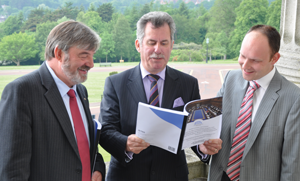Alban Maginness: Assembly R&D recommendations
Northern Ireland needs a clear vision in government to revive its R&D culture, according to the Assembly’s Enterprise, Trade and Investment Committee. Chairman Alban Maginness outlines the key findings from its inquiry into developing the economy through innovation, research and development.
With a highly skilled workforce and large numbers of talented and innovative researchers in both our local universities, it is hard to believe that Northern Ireland still lags far behind its European counterparts when it comes to identifying and accessing vital R&D funding.
Not only has Northern Ireland fallen behind in a wider European context but within the UK generally we find ourselves consistently lagging behind in terms of annual business expenditure on R&D. In the past five years, Northern Ireland has averaged 0.69 per cent of gross value added (GVA) compared to 1.23 per cent for the UK as a whole.
Furthermore, just ten companies in Northern Ireland accounted for approximately 57 per cent of all business R&D in 2009. The figures as they currently stand are a cause for concern and it would appear that the importance of R&D to stimulating and growing the local economy is not yet receiving the necessary focus, investigation or investment required.
It was within this context that the Assembly Enterprise, Trade and Investment Committee decided to initiate an inquiry to find out what barriers are preventing local businesses from investing in R&D. Importantly, we also wanted to identify what additional measures government can put in place to ensure that the right level of support, advice and information on R&D opportunities is available to all businesses in Northern Ireland
One of the main drawbacks we discovered early on in the inquiry was the lack of a clear and overarching vision for innovation, research and development. While there are undoubtedly a number of mechanisms in place that provide support and resources to local companies wanting to extend their capabilities and/or to invest in R&D, they are not always widely accessible or known about.
If we are to compete in the global economy, we must strive towards developing an approach that is uniformly effective across the region, one that is underpinned and supported by clear and definable structures, policies and strategies that will ultimately stimulate and develop an R&D culture in all sectors and across all levels in Northern Ireland.
While there is no doubt that both DETI through its wider Economic Strategy and Invest NI on an operational basis have provided a high degree of support to local businesses across the economic spectrum, we are determined that more can be done to ensure that the overall approach is holistic, efficient and co-ordinated.
Many of those we spoke to during the committee inquiry highlighted the somewhat disjointed nature of support and advice on offer, the lack of available information and the need to build awareness of what programmes are available and how they can be accessed.
In response to these concerns, our report identified and recommended a number of practical and short term measures to enhance the uptake of funding. For example we have recommended that consideration be given to the appointment of a Chief Scientific Officer to advise government as well as a high level steering group comprising experts from the fields of government, academia and business. We believe that both will be crucial first steps in engendering a new and endemic culture of R&D.
We also recommend the establishment of a new organisation, a one-stop shop if you will, tasked with developing and streamlining the application process, coordinating systems and processes at the point of delivery and raising general awareness of the range of programmes available and how they can be accessed.
We also see a very real and tangible role for the further and higher education sectors as well as local councils in delivering co-ordinated programmes, courses and tailored mentoring schemes that will take businesses and individuals from the initial stages of the funding application all the way through to project evaluation
Similar organisations already exist in Great Britain, Finland and Sweden, all of which have had a high level of success in R&D. I feel strongly that we must robustly investigate and evaluate the mechanisms used by these countries as appropriate benchmarks for the direction in which Northern Ireland should move in the future.
We were concerned that uptake by Northern Ireland companies of the R&D funding available through EU Framework Programme (FP7), which is due to end in 2013, was markedly low. In fact, according to the HM Treasury consultation document ‘Rebalancing the Northern Ireland economy’, Northern Ireland’s uptake of available funding is almost half of the UK average.
Many of the organisations we spoke to during the inquiry cited that one of the key concerns in accessing European funding was the complexity of the application process which often discouraged smaller, less resourced businesses from exploring the benefits of investment in R&D.
The introduction of the next European funding stream, Horizon 2020, which is due to start in 2014, has been designed to include a more straightforward application process which we hope will go some way towards reducing the administrative burden for would-be applicants.
With more than €80 billion available in the Horizon 2020 funding pot, we must ensure that the appropriate tools and support mechanisms as recommended in our report are implemented to allow us to take full advantage of the new opportunities on offer.
We must step away from our reliance on traditional industry and dependence on government support. In the current global economic climate, along with UK proposals to reduce regional support, neither option is sustainable or viable.
I believe that we have a very real and exciting opportunity to maximise and exploit our home-grown talent and expertise and have no doubt that a co-ordinated and integrated approach to investment in R&D, can only result, in the long term, in putting Northern Ireland at the forefront of global innovation.






